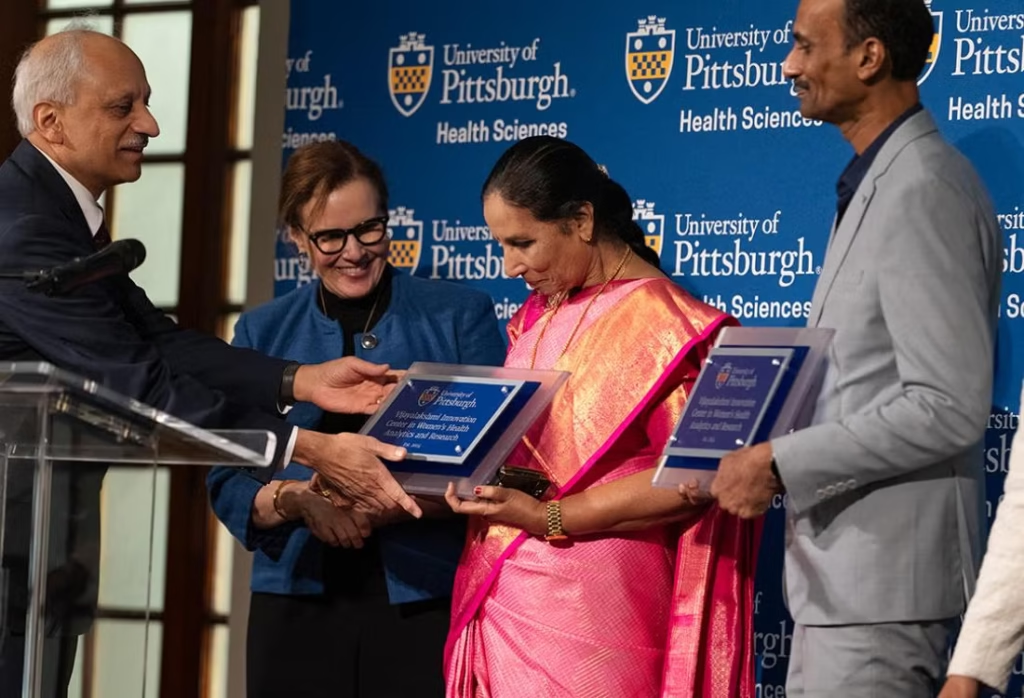The University of Pittsburgh has launched the Vijayalakshmi Innovation Center in Women’s Health Analytics and Research (VIHAR) to address significant disparities in women’s health and wellness worldwide.
The initiative is made possible through a generous donation from Indian American siblings, Dr. Vishnu Vardhan and Harsha Vardhini, cofounders of Vizzhy Inc., along with funding from Pitt’s School of Medicine.
Vizzhy Inc., a Texas-based leader in generative AI systems for innovative healthcare applications, aims to tackle the root causes of metabolic diseases and provide personalized guidance for managing chronic illnesses. This partnership underscores the company’s mission to use cutting-edge technology to improve health outcomes.
According to a statement from the University of Pittsburgh, VIHAR will expand on the work of the Pattern Recognition from Biomedical Evidence (PRoBE) laboratory, led by Vanathi Gopalakrishnan, associate professor of biomedical informatics at Pitt’s School of Medicine. Gopalakrishnan, who will serve as VIHAR’s founding director, envisions assembling a global team of scientists from leading universities to advance groundbreaking research and training.

One of VIHAR’s ambitious goals is to develop female digital health twins—virtual models designed to revolutionize the understanding and treatment of women’s health issues. The center will also focus on producing and harmonizing multimodal data to integrate diverse aspects of women’s health across their lifespan.
“This support will allow us, for example, to combine artificial intelligence with mobile applications and sensor-based approaches to identify how we can directly benefit vulnerable populations such as at-risk mothers by proactive resource allocations,” Gopalakrishnan said. “I cannot thank Vishnu and Harsha enough for their vision and trust in us to advance science and make a global impact.”
VIHAR’s establishment marks a significant step toward addressing health inequities faced by women globally while harnessing the transformative potential of AI and advanced analytics in healthcare.
“Issues facing women and girls are underrepresented in medical research, which results in fewer treatments available for them,” said Anantha Shekhar, senior vice chancellor for the health sciences and John and Gertrude Petersen Dean of the School of Medicine at Pitt. “VIHAR will directly address this issue by coalescing communities of researchers and developing innovative AI tools for efficient analyses.”
Through this generous gift, Dr. Vardhan has been helping to address a global problem.
“Women and girls from Pittsburgh to my hometown in India suffer from a lack of understanding about the issues that uniquely affect their health and wellness,” Dr. Vardhan said. “My sister and I believe our gift will accelerate the process of eliminating those disparities and lead to an improved quality of life for women and the people who love them.”
Vardhan and Vardhini chose to name the new center after their mother.
“Our mother struggles mightily with diabetes and should not have to. Her condition is what encouraged my brother and me to create our company,” Vardhini said. “The center, named in her honor, has the potential to make life better for millions of women and girls by harnessing the knowledge we already have to create new discoveries and better global health.”
As the first global innovation center to integrate women’s health research with advanced AI and analytics, VIHAR will leverage the strengths of Pitt’s Department of Biomedical Informatics (DBMI) and its biotechnology facilities. The center plans to collaborate with prominent organizations, including the Women’s Health and Education Center and the World Health Organization, to drive impactful research and solutions.
“At Pitt, we have developed an ecosystem for health analytics data mining that is second to none, and it has become a training ground for pre- and postdoctoral researchers,” said Michael J. Becich, Distinguished Professor and chair of DBMI. “With the addition of VIHAR, we will establish a new area of concentration in the application of artificial intelligence for women’s health—leading to new understanding and breakthroughs.”






